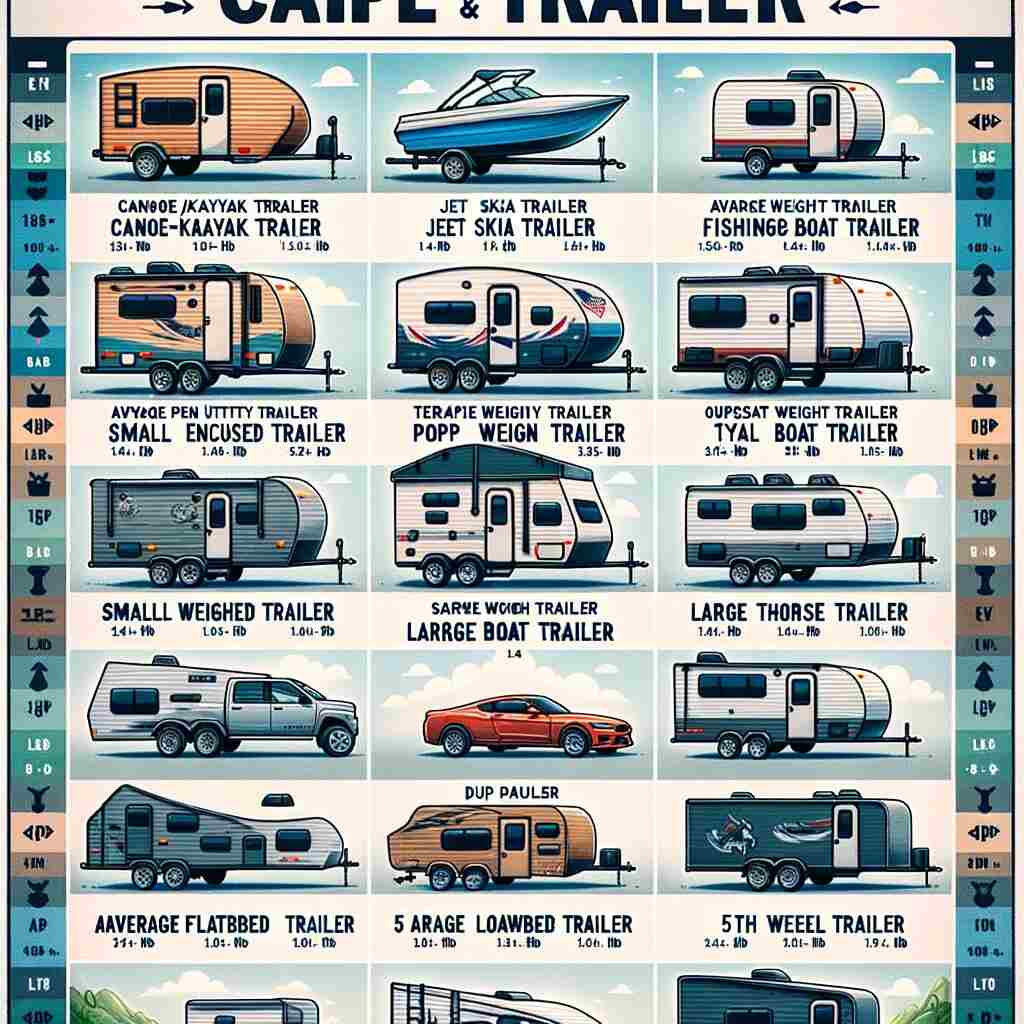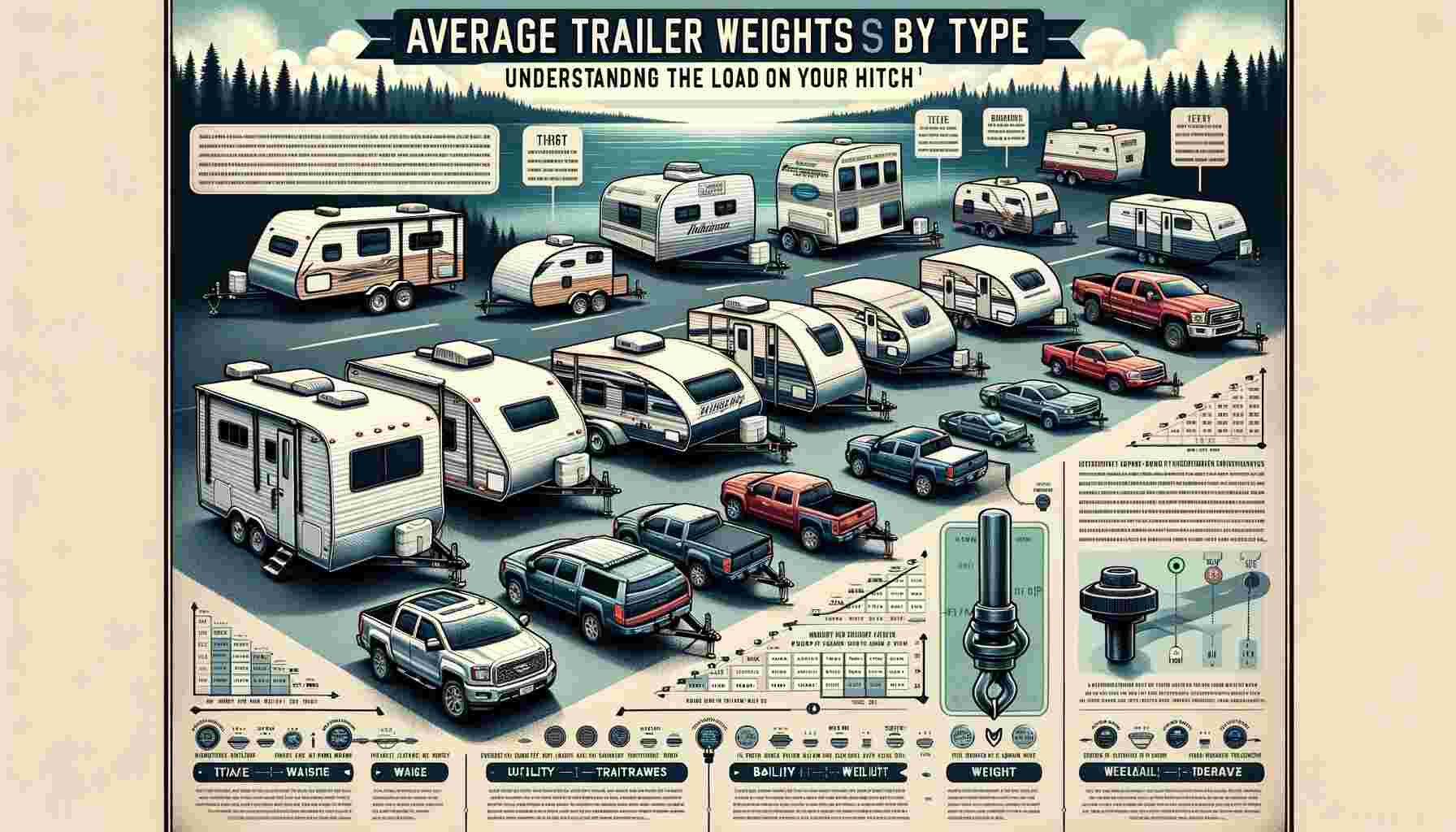When it comes to towing, knowing the weight of your trailer is not just a matter of curiosity; it’s a critical aspect of ensuring safety on the road. Whether you’re planning a weekend getaway with a small travel trailer, heading to the lake with your jet ski, or moving cargo with a flatbed trailer, understanding the weight of your trailer is crucial.
In this comprehensive guide, we’ll delve into the world of trailer weights, providing you with valuable insights into how much different types of trailers typically weigh. We’ll begin with a detailed examination of trailer weight charts and camper weight charts to provide you with a solid foundation. Then, we’ll explore the specific weights of various trailer types, helping you make informed decisions for your towing needs.
How Much Does a Trailer Weigh?
Trailer Weight Chart: Unveiling the Numbers
Before we delve into the specifics of individual trailer types, let’s start with a trailer weight chart. This chart provides a broad overview of the average weights for various trailer categories. Keep in mind that these figures are approximate and can vary based on factors such as trailer size, materials, and added accessories.

Average Trailer Weights Chart by Type
| Trailer Type | Average Empty Weight (lbs.) | Empty Weight Range (lbs.) | GVWR (lbs.) | Average Load Capacity (lbs.) |
|---|---|---|---|---|
| Canoe / Kayak Trailer | 200 | 100-300 | 500 | 300 |
| Jet Ski Trailer | 300 | 200-400 | 800 | 500 |
| Motorcycle Trailer | 500 | 300-700 | 1200 | 700 |
| Fishing Boat Trailer | 800 | 600-1000 | 1800 | 1000 |
| Tow Dolly | 600 | 500-700 | 1300 | 700 |
| Small Open Utility Trailer | 700 | 600-800 | 1500 | 800 |
| Small Enclosed Trailer | 850 | 700-1000 | 2000 | 1150 |
| Teardrop Trailer | 1000 | 800-1200 | 2200 | 1200 |
| A-Frame Camper | 1200 | 1000-1400 | 2400 | 1200 |
| Car Trailer | 1500 | 1300-1700 | 3000 | 1500 |
| Large Boat Trailer | 2000 | 1800-2200 | 4000 | 2000 |
| Pop Up Camper | 1800 | 1600-2000 | 3600 | 1800 |
| Large Enclosed Trailer | 2200 | 2000-2400 | 4400 | 2200 |
| Small Travel Trailer | 2500 | 2300-2700 | 5000 | 2500 |
| Small Horse Trailer | 2700 | 2500-2900 | 5400 | 2700 |
| Large Flatbed Trailer | 3000 | 2800-3200 | 6000 | 3000 |
| Dump Trailer | 3300 | 3100-3500 | 6600 | 3300 |
| Large Travel Trailer | 3500 | 3300-3700 | 7000 | 3500 |
| Gooseneck Flatbed Trailer | 4000 | 3800-4200 | 8000 | 4000 |
| Large Livestock Trailer | 4500 | 4300-4700 | 9000 | 4500 |
| Toy Hauler | 5000 | 4800-5200 | 10000 | 5000 |
| 5th Wheel Camper | 5500 | 5300-5700 | 11000 | 5500 |
This detailed table provides a comprehensive overview of the various trailer types and their respective weights and capacities. Please note that these numbers are average estimates and may vary depending on the manufacturer, trailer model, and any additional modifications or accessories.
Camper Weight Chart: Tailoring Your Camping Experience
If you’re particularly interested in camper trailers, it’s helpful to look at a camper weight chart. Camper trailers come in various shapes and sizes, each offering a unique camping experience. Here’s an overview of average weights for different camper types:
Average Camper Weight Chart
Here’s the table for the specified camper types along with their specifications:
| Camper Type | Average Empty Weight (lbs.) | Empty Weight Range (lbs.) | GVWR (lbs.) | Average Load Capacity (lbs.) |
|---|---|---|---|---|
| A-Frame Camper | 1,200 | 1,000-1,400 | 2,400 | 1,200 |
| Pop Up Camper | 1,800 | 1,600-2,000 | 3,600 | 1,800 |
| Small Travel Trailer | 2,500 | 2,300-2,700 | 5,000 | 2,500 |
| Large Travel Trailer | 3,500 | 3,300-3,700 | 7,000 | 3,500 |
| Toy Hauler | 5,000 | 4,800-5,200 | 10,000 | 5,000 |
| 5th Wheel Camper | 5,500 | 5,300-5,700 | 11,000 | 5,500 |
This table provides a focused look at the various specified camper types and their respective weights and capacities. Understanding these average weights is a great starting point for anyone planning to tow a camper trailer. However, keep in mind that the specific weight of a camper can vary depending on its size, construction materials, and the amenities it offers.
Trailer Weights Explained: Beyond the Numbers
To gain a deeper understanding of trailer weights, let’s break down the components that contribute to a trailer’s overall weight:
1. Trailer Frame:
- Description: The frame serves as the backbone of the trailer, providing structural support. It is typically made of materials such as steel or aluminum. The choice of materials and the frame’s construction can significantly impact the trailer’s weight.
2. Wheels and Tires:
- Description: The type and size of wheels and tires used on a trailer can affect its weight. Larger wheels and tires may add extra pounds to the overall trailer weight.
3. Flooring and Walls:
- Description: Trailers come with different types of flooring and wall materials, including wood, aluminum, or fiberglass. The choice of materials can influence the trailer’s weight.
4. Accessories:
- Description: Additional accessories such as spare tires, toolboxes, cargo racks, or specialized hitches can increase a trailer’s weight. It’s essential to account for these additions when calculating the total weight.
5. Cargo:
- Description: The cargo you load onto the trailer is a significant factor in its weight. It’s crucial to stay within the trailer’s weight capacity and ensure even distribution of the load for safe towing.
6. Axles and Suspension:
- Description: Trailers have one or more axles that support their weight. The type and number of axles, along with the suspension system, play a crucial role in the trailer’s weight-bearing capacity. Upgrading the axles and suspension can sometimes increase a trailer’s capacity, but this should be done carefully and in consultation with experts.
Now that we’ve covered the fundamentals of trailer weights let’s delve into the specific weights of various trailer types:
Specific Trailer Types and Their Weights
Canoe / Kayak Trailer Weight
- Average Weight: 200 – 500 lbs
- Description: Canoe and kayak trailers are designed with lightweight materials and simple construction to safely transport watercraft. These trailers are relatively easy to tow and provide a convenient way to transport canoes or kayaks to your favorite paddling spots.
Jet Ski Trailer Weight
- Average Weight: 300 – 800 lbs
- Description: Jet ski trailers are compact and lightweight, specifically designed for transporting personal watercraft. Their weight varies based on the number of jet skis they can carry and their size.
Motorcycle Trailer Weight
- Average Weight: 300 – 1,500 lbs
- Description: Motorcycle trailers come in various sizes, from single-bike carriers to larger trailers capable of transporting multiple motorcycles. The weight depends on their size, construction materials, and additional features.
Fishing Boat Trailer Weight
- Average Weight: 800 – 2,500 lbs
- Description: Fishing boat trailers are designed to transport fishing boats of different sizes. The weight of these trailers can vary significantly depending on the length and construction of the boat.
Tow Dolly Weight
- Average Weight: 500 – 1,500 lbs
- Description: Tow dollies are used for towing vehicles behind another vehicle. They are relatively lightweight and compact, making them easy to store when not in use. The weight of a tow dolly depends on its design and capacity.
Small Open Utility Trailer Weight
- Average Weight: 500 – 1,500 lbs
- Description: Small open utility trailers are versatile and can be used for transporting a wide range of items, from landscaping equipment to furniture. Their weight varies based on their size and the materials used in their construction.
Small Enclosed Trailer Weight
- Average Weight: 1,000 – 3,000 lbs
- Description: Small enclosed trailers offer protection for your cargo and are commonly used for moving or storage purposes. Their weight depends on their size and the materials used to build them.
Teardrop Trailer Weight
- Average Weight: 1,500 – 3,000 lbs
- Description: Teardrop trailers are known for their compact and lightweight design, making them an excellent choice for campers seeking a cozy and minimalist camping experience. Their weight can vary depending on their size and the amenities they offer.
A-Frame Camper Weight
- Average Weight: 1,500 – 4,000 lbs
- Description: A-frame campers provide a convenient and comfortable camping experience. Their weight varies depending on their size and the amenities they are equipped with. Larger A-frame campers tend to weigh more.
Car Trailer Weight
- Average Weight: 1,500 – 4,500 lbs
- Description: Car trailers are designed for the transportation of vehicles. Their weight depends on their size and their capacity to carry different types of vehicles, from compact cars to larger SUVs.
Large Boat Trailer Weight
- Average Weight: 2,000 – 7,000 lbs
- Description: Large boat trailers are built to transport sizable watercraft such as fishing boats, speedboats, or sailboats. The weight of these trailers can vary based on the size of the boat they are designed to accommodate and the materials used in their construction.
Pop Up Camper Weight
- Average Weight: 1,500 – 3,500 lbs
- Description: Pop-up campers are lightweight and compact when towed, making them a popular choice among campers. These campers expand into comfortable living spaces when set up at the campsite, and their weight depends on their size and the amenities they offer.
Large Enclosed Trailer Weight
- Average Weight: 3,000 – 8,000 lbs
- Description: Large enclosed trailers are used for transporting a wide range of cargo, from motorcycles to construction equipment. The weight of these trailers depends on their size and the materials used in their construction.
Small Travel Trailer Weight
- Average Weight: 2,500 – 5,000 lbs
- Description: Small travel trailers offer the convenience of a home on wheels, making them a popular choice for road trips and camping adventures. Their weight can vary based on their size and the amenities they provide.
Small Horse Trailer Weight
- Average Weight: 2,000 – 5,500 lbs
- Description: Small horse trailers are designed to transport one or two horses safely. Their weight depends on the number of horses they can accommodate and the materials used in their construction.
Large Flatbed Trailer Weight
- Average Weight: 3,000 – 8,000 lbs
- Description: Large flatbed trailers are versatile and used for transporting heavy and oversized cargo. The weight of these trailers depends on their size and load capacity, with larger flatbeds being heavier.
Dump Trailer Weight
- Average Weight: 2,500 – 8,000 lbs
- Description: Dump trailers are commonly used in construction and landscaping for hauling materials such as gravel or debris. Their weight varies based on their size and load capacity.
Large Travel Trailer Weight
- Average Weight: 4,000 – 12,000 lbs
- Description: Large travel trailers provide spacious living areas for extended camping trips. These trailers offer a range of amenities, and their weight can vary significantly depending on their size and the features they include.
Gooseneck Flatbed Trailer Weight
- Average Weight: 5,000 – 15,000 lbs
- Description: Gooseneck flatbed trailers are heavy-duty and ideal for transporting large and heavy loads. Their weight is higher due to their size and load-bearing capacity, and they are often used in commercial and industrial settings.
Large Livestock Trailer Weight
- Average Weight: 4,000 – 10,000 lbs
- Description: Large livestock trailers are designed to safely transport animals such as cattle, horses, or sheep. The weight of these trailers depends on their size, capacity, and the materials used in their construction.
Toy Hauler Weight
- Average Weight: 5,000 – 14,000 lbs
- Description: Toy haulers combine living space with storage for recreational vehicles such as ATVs, motorcycles, or dirt bikes. Their weight varies based on their size, amenities, and the weight of the toys they are designed to carry.
5th Wheel Camper Weight
- Average Weight: 7,000 – 18,000 lbs
- Description: 5th wheel campers offer spacious interiors and are towed using a specialized hitch located in the bed of a pickup truck. These campers are among the heaviest in the category due to their size and the amenities they provide.
Trailer Equipment and Camping Gear: Must-Have Recommendations
To ensure a safe and enjoyable towing experience, it’s essential to have the right equipment. Here are some highly recommended products that can help with your trailer needs, all available on Amazon:
1. Trailer Equipment:
Hitches
- Curt Class 3 Trailer Hitch: Secure your load with this durable hitch. Find it on Amazon.
- Reese Towpower Hitch Receiver: Trusted by towing professionals. Check it out here.
- B&W Trailer Hitch: Offers strength and reliability. Available here.
Tie-Down Straps
- Rhino USA Heavy Duty Ratchet Straps: Premium ratchet straps for peace of mind. Get them here.
- Erickson Retractable Ratchet Straps: Convenient and retractable design. See on Amazon.
- Keeper 1″ x 12′ Cam Buckle Tie-Down: Lightweight and efficient. Shop now.
Trailer Accessories
- CURT Breakaway Switch: Ensure trailer braking control. Buy it here.
- Hopkins Trailer Light Tester: Quickly test your trailer lights. Check it out.
- Tow Ready Trailer Wiring Harness: Keep your trailer lights operational. Shop on Amazon.
Weight Distribution Systems
- Equal-i-zer 4-Point Sway Control Hitch: Reduce sway and improve control. Find it on Amazon.
- Fastway e2 Hitch: Simple yet effective weight distribution. Get it here.
2. Camping Gear
Tents:
- Coleman Sundome Tent: Affordable and reliable camping tent. Find it here.
- ALPS Mountaineering Lynx Tent: Durable and lightweight. Check it out.
- CORE 9-Person Instant Cabin Tent: Spacious for larger groups. Available here.
Portable Grills
- Weber Q1200 Portable Grill: High-quality portable grilling. Buy it on Amazon.
- Cuisinart CGG-180 Petit Gourmet: Compact yet versatile grill. Find it here.
- Coleman RoadTrip 285 Portable Stand-Up Grill: Ideal for camping. Get it here.
Camping Chairs
- Kijaro Dual Lock Portable Camping Chair: Comfortable and stable. Shop now.
- ALPS Mountaineering King Kong Chair: Heavy-duty comfort. Check it out here.
- Helinox Chair One: Ultra-light and compact design. Available here.
FAQs Addressing Common Questions
Now that we’ve covered various trailer types and their weights, let’s address some frequently asked questions related to trailer weights:
Q1: How do I determine the weight of my trailer?
A1: To determine the weight of your trailer, you can use a truck scale or visit a weigh station. Ensure that your trailer is empty or loaded as you intend to use it, as the weight can vary based on cargo.
Q2: Why is knowing my trailer’s weight important?
A2: Knowing your trailer’s weight is crucial for safe towing. It helps you avoid overloading, which can lead to accidents and damage to your vehicle. Additionally, it ensures compliance with towing regulations.
Q3: Are there weight limits for towing trailers?
A3: Yes, there are weight limits for towing trailers, which vary by state and country. It’s essential to be aware of these limits and ensure your towing setup stays within the legal weight restrictions.
Q4: Can I upgrade my trailer’s axles to increase its weight capacity?
A4: In some cases, upgrading your trailer’s axles and suspension may increase its weight capacity. However, it’s essential to consult with a professional and ensure that your trailer frame can handle the increased load.
Q5: What should I do if I suspect my trailer is overweight?
A5: If you suspect your trailer is overweight, it’s crucial to offload some cargo or reconfigure your load to comply with weight limits. Overloaded trailers can lead to dangerous situations on the road.
Q6: How can I balance the weight on my trailer for safe towing?
A6: Properly balancing the weight on your trailer is essential for safe towing. Ensure that the weight is evenly distributed, with slightly more weight towards the front of the trailer. Use tie-downs and secure your cargo to prevent shifting.
Conclusion
Understanding the average trailer weights by type is a fundamental aspect of safe and responsible towing. Whether you’re planning a leisurely camping trip with a teardrop trailer or transporting heavy equipment with a flatbed trailer, knowing your trailer’s weight and staying within legal limits is paramount.
Always consult manufacturer guidelines and adhere to towing regulations to ensure a smooth and safe towing experience.
Disclosure: This article contains affiliate links. If you click on these and purchase a product, we may receive a small commission at no additional cost to you.








